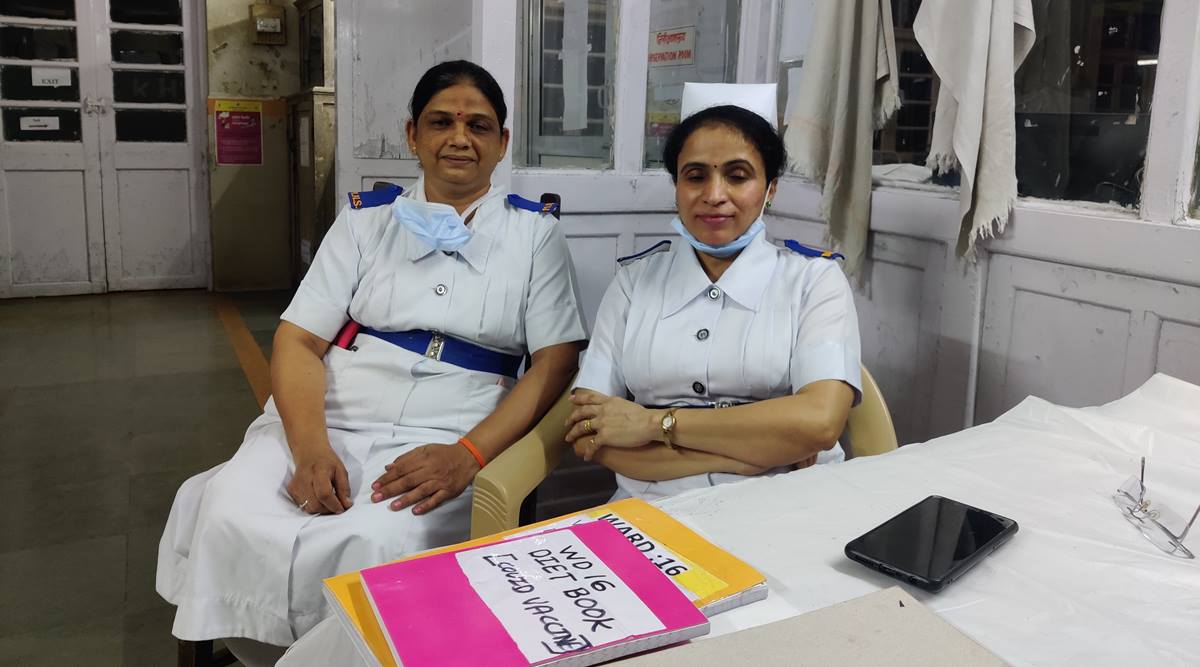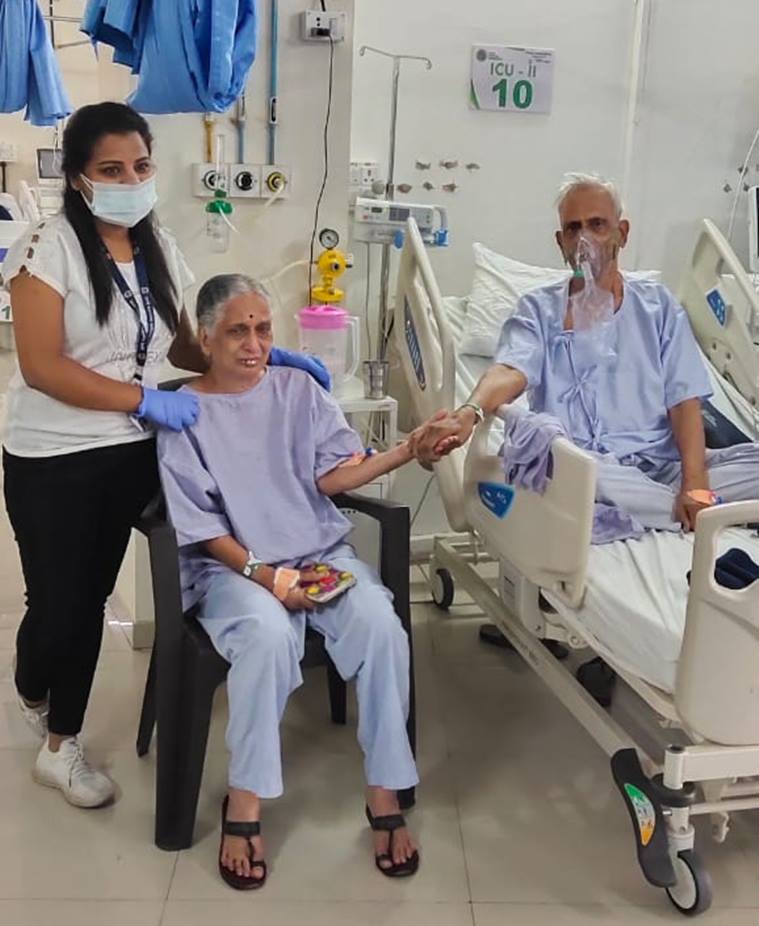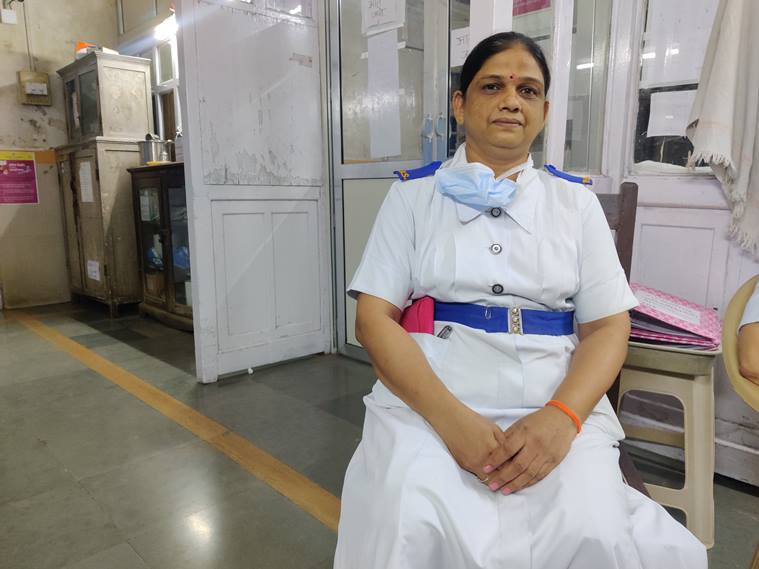 Madhavi Save (right) and Anagha Rao were posted in the ICU ward of Kasturba hospital in Mumbai during the peak of pandemic. (Express Photo)
Madhavi Save (right) and Anagha Rao were posted in the ICU ward of Kasturba hospital in Mumbai during the peak of pandemic. (Express Photo) Memories – some good, some bad, but all unforgettable. Thane hospital’s ICU nurse in-charge Shital More says the scenes during the initial stages of the pandemic were of panic and fear, despair and tears and relief and cheer, which will remain with her forever.
One memory is of a surprise parcel of homemade fish curry that a discharged patient sent to her. There was even a confession. A man told her that he had been cheating on his wife and living with another woman. His last wish was to seek forgiveness and hand over cash stashed in his shop to his wife and their two children in an Uttar Pradesh village.
At the Thane Covid hospital where she works, over 700 patients have been under More’s care. For several, she was the final audience.
For the nurses who worked in the ICUs, last year has not only been about living away from families or about the difficulty of working in PPEs, it has also been about forging new friendships with lonely patients and giving them a hand to hold on to as they breathed their last.
Nurses have changed the clothes of patients, trimmed their hair, cut nails, shared their tiffin and even prayed with them to make
them happy. Their worst memory yet is of seeing several die of Covid-19 with their last wishes left unfulfilled.
 Shital More arranged meeting for an elderly couple, admitted in same hospital but in different wards. (Express photo)
Shital More arranged meeting for an elderly couple, admitted in same hospital but in different wards. (Express photo)
More (23) remembers Vishwanath of Bed No. 12. “He must have realised his end is near. One day, he called me and confessed that he had abandoned his wife for another woman. He wanted her forgiveness. He gave me her address and number before dying,” More recollects. She could not get Vishwanath to talk to his wife before his death but she did convince her to travel to Thane to see him one last time and collect the cash he left in his store. “We kept his body for two days in the morgue,” she adds.
More fulfilled the wishes of some patients. A septuagenarian couple was admitted in different wards, both critical and on oxygen support. “The husband and wife wanted to meet each other. We took special permission from doctors, got an oxygen cylinder for the wife and took her to his bed. They held hands,” she says. The husband died shortly later, and the wife survived.
The memory of Radhika, a 61-year-old woman, is still fresh in nurse Madhavi Save’s mind. She was on oxygen support in Kasturba Hospital’s ICU. Her lungs were affected by the virus. But she wanted to live just long enough to see her grandchild. Days before her daughter-in-law gave birth to a child, Radhika died. “I will never forget… she kept asking us, ‘Will I get to see my grandchild?’ We could not fulfil her last wish,” says Save (51). Save trimmed nails, cut hair and changed clothes of another patient, Rekha. She made her laugh as well. Eighteen days later when Rekha was discharged, the 66-year-old touched the nurse’s feet and cried.
The fear of infection has receded. Save has been vaccinated. But memories from the pandemic remain as fresh as it was yesterday.
“This was a war. In 27 years of service, I have never experienced what we saw last year,” she says. Kasturba Hospital was the first Covid hospital in Mumbai, and Save looked after the city’s first Covid-19 case. Doctors would start a line of treatment for a patient and proceed to the next ward, but nurses would remain in same ward the whole day.
“Initially in March, rich, foreign-returned people came and kept complaining about the toilets, water and food. From April to June, patients who came were fearful; they felt they would never return home. We were not only fighting the virus, we were fighting with patients’ fear and anxiety,” she added.
When Mumbai was fighting the Covid-19 peak, nurse Anagha Rao would return home and imagine dead bodies. She realised what patients must be going through. She would draw curtains between beds so that one patient did not have to see another die. “There were several dying every day. A patient, Shweta, kept saying she would die. I asked her to stop looking at other patients. Every day I used to download a ‘mantra’ and ask her to repeat it. Sometimes positive attitude helps,” she says. Shweta recovered a month later. The two still keep in touch.
 When Mumbai was fighting the Covid-19 peak, nurse Anagha Rao would return home and imagine dead bodies. (Express photo)
When Mumbai was fighting the Covid-19 peak, nurse Anagha Rao would return home and imagine dead bodies. (Express photo)
In KEM, once a patient got critical and was moved to the ICU, all valuables, including mobile phone, would be given to the family for safekeeping.
Nurse Mrunal Mangesh Hatale says a patient named Vijaya Laxmi never asked for food or video calls to her family, but every morning she wanted tea. Since hospital only provided milk to patients, Hatale started sharing her tea. The nurse and the patient had conversations over tea. A fortnight later, Vijaya passed away.
“But she drank tea that morning,” says Hatale.
For her, the most painful memory of Covid-19 was witnessing a couple die in the ICU. Hatale still wonders how their two children are coping. “The man was a police officer. I would see him walk up to his wife daily and calm her down. We all tried to counsel her. She passed away 15 days later, and his condition suddenly deteriorated. After two days, he also died. I think it was shock.” Hatale remembers.
Until last year, these nurses were saving patients’ lives from Covid-19 through treatment. This year, they are saving lives through vaccinations. Both Save and Rao spend entire day in vaccination room together immunising over 500 people a day.
More said the pandemic brought out both the best and the worst in people. “Parents, no matter how old, would always turn up if their son or daughter died. But other family members, even siblings, would make excuses and ask us to cremate,” she adds.